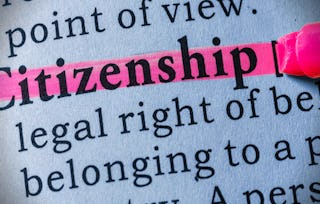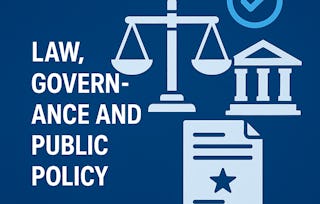This course will examine the various ways that individuals engage in a democratic society during the 21st century. Students reflect on their involvement, and sense of responsibility to something beyond individual pursuits, and how they can make a difference within the various contexts of neighborhoods, communities, nationally and globally. Exploration of relevant social problems, critical examination and reflection on what it means to be a citizen within these various contexts as well as an examination of personal values and assumptions, assist students in gaining a deeper understanding of themselves relative to the larger social context. This course also provides opportunities for the development of civic skills and values to enhance the student’s capacity to positively impact their community.

Pathways to Civic Engagement
3 days left! Gain next-level skills with Coursera Plus for $199 (regularly $399). Save now.

Skills you'll gain
- Social and Human Services
- Community Organizing
- Community Development
- Social Justice
- Cultural Diversity
- Community Outreach
- Student Engagement
- Collaboration
- Social Impact
- Empathy
- Immigration Law
- Diversity Awareness
- Mental Health Diseases and Disorders
- Social Skills
- Community and Social Work
- Social Work
- Disabilities
- Communication
Details to know

Add to your LinkedIn profile
4 assignments
See how employees at top companies are mastering in-demand skills

There are 4 modules in this course
In this module, we will be considering key differences between civic engagement and service-learning. We also consider the connections between civic engagement and innovation. Additionally, using our individual resources in the community (what is sometimes called social capital) will be discussed. The role of cooperation, collaboration, and social order within our diverse society will be considered.
What's included
6 videos13 readings1 assignment
In this module, collaboration approaches and skills that can be used in groups and in the community are explored. Information on group dynamics and best practices when collaborating with others are also provided. Additionally, cultural diversity and making connections in a diverse society are discussed.
What's included
3 videos5 readings1 assignment
In this module, engaging in the community to address homelessness, poverty, and food insecurity will be explored as well as ways civic engagement is used to address these issues.
What's included
3 videos5 readings1 assignment
Many in the United States would describe US immigration as a flawed system. In this module, the past and present state of immigration and refugees will be explored as well as the potential role of civic engagement in addressing problems associated with migration. Additionally, we will discuss disabilities and mental health: what are they, what social stigmas are connected to them, and what is the role of civic engagement in addressing accessibility for all?
What's included
3 videos5 readings1 assignment
Prepare for a degree
Taking this course by University of North Texas may provide you with a preview of the topics, materials and instructors in a related degree program which can help you decide if the topic or university is right for you.
Instructor

Offered by
Explore more from Personal Development
 Status: Preview
Status: PreviewDuke University
 Status: Preview
Status: PreviewUniversity of Geneva
 Status: Preview
Status: PreviewO.P. Jindal Global University
 Status: Preview
Status: PreviewLund University
Why people choose Coursera for their career

Felipe M.

Jennifer J.

Larry W.

Chaitanya A.
Frequently asked questions
To access the course materials, assignments and to earn a Certificate, you will need to purchase the Certificate experience when you enroll in a course. You can try a Free Trial instead, or apply for Financial Aid. The course may offer 'Full Course, No Certificate' instead. This option lets you see all course materials, submit required assessments, and get a final grade. This also means that you will not be able to purchase a Certificate experience.
When you purchase a Certificate you get access to all course materials, including graded assignments. Upon completing the course, your electronic Certificate will be added to your Accomplishments page - from there, you can print your Certificate or add it to your LinkedIn profile.
Yes. In select learning programs, you can apply for financial aid or a scholarship if you can’t afford the enrollment fee. If fin aid or scholarship is available for your learning program selection, you’ll find a link to apply on the description page.
More questions
Financial aid available,





